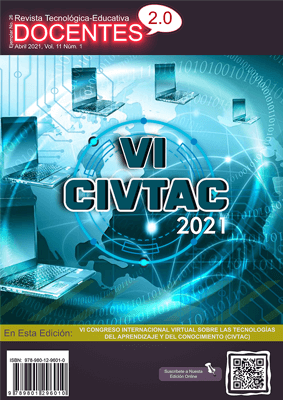Research Hotbed in Chemistry and Student Attitude Towards the Laboratory
 DOI:
https://doi.org/10.37843/rted.v11i1.190
DOI:
https://doi.org/10.37843/rted.v11i1.190
Main Article Content
Abstract
It is recognized worldwide how vital the school chemistry laboratory is as a space for academic training. This article analyzed the influence of a research hotbed in chemistry on academic performance and attitudes towards the subject's school laboratory was in six eighth-grade students from the Cristo Rey Superior Normal School. The study consisted of five phases: statement of the problem, conceptualization, projection, interaction, and, finally, evaluation. The variation in academic performance was studied using the final grades of the chemistry subject in periods 1 to 4. The attitude of the students was analyzed using a field diary in addition to the filme record. Finally, measured the variation in anxiety levels was with a Spanish translation of the survey for measuring anxiety levels in the chemistry laboratory, designed by Bowen (1999). So far, considering the results obtained, it can be stated that academic performance is not directly influenced by attendance at the seedbed. Second, a positive evolution in emotions and attitudes towards the laboratory is demonstrated. Finally, group anxiety is expected to decrease. The results presented here agree with international antecedents, thus establishing a precedent in measuring pressure in the chemistry laboratory in the context of a national research hotbed.
Downloads
Metrics
Article Details

This work is licensed under a Creative Commons Attribution-NonCommercial-NoDerivatives 4.0 International License.
Those authors who have publications in our journal accept the following terms:
- When a work is accepted for publication, the author retains rights of reproduction, distribution of his/her article for exploitation in all countries of the world in the format provided by our magazine and any other magnetic medium, optical, and digital.
- Authors will retain their copyright and guarantee the journal the right first to publish their work, which will be simultaneously subject to the Creative Commons Acknowledgment License (Attribution-NonCommercial-NoDerivatives 4.0 International (CC BY-NC-ND 4.0)). That allows third parties to copy and redistribute the material in any medium or format, under the following conditions: Acknowledgment - You must properly acknowledge authorship, provide a link to the license, and indicate if any changes have been made. You may do so in any reasonable way, but not in a way that suggests you have the licensor's endorsement or receive it for your use. NonCommercial - You may not use the material for a commercial purpose. NoDerivatives - If you remix, transform, or build from the material, you cannot broadcast the modified material. There are no additional restrictions - You cannot apply legal terms or technological measures that legally restrict you from doing what the license allows.
- Authors may adopt other non-exclusive license agreements to distribute the published version of the work (e.g., deposit it in an institutional archive or publish it in a monographic volume) provided that the initial publication in this journal is indicated.
- Authors are allowed and recommended to disseminate their work through the Internet (e.g., in institutional telematic archives, repositories, libraries, or their website), producing exciting exchanges and increasing the published work's citations.
- Request of withdrawal an article has to be done in writing by the author to the Editor, becoming effective after a written response from the Editor. For this purpose, the author or authors will send correspondence via e-mail: [email protected].
- The author will not receive financial compensation for the publication of his work.
- All Docentes 2.0 Journal publications are under the Open Journal System (OJS) platform at: https://ojs.docentes20.com/.
References
American Chemical Society (2018). ACS Guidelines and recommendations for reaching middle and high school chemistry. The American Chemical Society.
Benlloch-Pla, M. S.P.L. (2019). Ansiedad ante las ciencias y pruebas de evaluación científicas: efectos del nivel académico y genero. Revista Científica, 34(1), 20-33. http://orcid.org/0000-0003-4690-6556
Bennet, J. (2003). Teaching and learning science: A guide to recent research and its applications. Continuum.
Bouras, N. & Holt, G. (2007). Psychiatric and behavioral disorders in intellectual and developmental disabilities. Cambridge University Press.
Bowen, C. (1999). Development and score validation of a chemistry laboratory anxiety instrument (CLAI) for college chemistry students. Educational and psychological measurement, 59(1), 171-185. https://doi.org/10.1177%2F0013164499591012 DOI: https://doi.org/10.1177/0013164499591012
Candela, B. F. (2014). Aprendiendo a enseñar química. La CoRe y los PaP-eRs como instrumentos para identificar y desarrollar el CPC. Programa Editorial de la Universidad del Valle.
Grupo Banco Mundial. (2021). Gasto público en educación, total (% del PIB) - Colombia. https://datos.bancomundial.org/indicador/SE.XPD.TOTL.GD.ZS?end=2018&locations=CO&start=1979&view=chart
Hernández-Sampieri, R., Fernández-Collado, C. & Baptista-Lucio, P. (2014). Metodología de la investigación. McGraw Hill.
Hofstein, A. & Lunetta, V. (1982). The role of the laboratory in science teaching: Neglected aspects of research. Review of Educational Research, 201-218. DOI: https://doi.org/10.3102/00346543052002201
Johnstone, A. H. (1982). Macro and microchemistry. School Science Review, 64(227), 377-379.
Mazzone, L. (2007). The role of anxiety symptoms in school performance in a community sample of children and adolescents. BMC Public Health, 7(1), 347. DOI: https://doi.org/10.1186/1471-2458-7-347
Ministerio de Educación Nacional (1998). Serie Lineamientos Curriculares: Ciencias Naturales y educación ambiental .MEN .
Patiño-Goméz, Z. L. & Martínez-Toro, P. (2015). Formación en investigación de la educación superior pública en Colombia en tiempos de reforma a la ley 30 de 1992. (U. d. Valle, Ed.). Programa Editorial Universidad del Valle.
Pintrich, P. & De Groot, E. (1990). Motivational and Self-Regulated Learning Components of Classroom Academic Performance. Journal of Educational Psychology, 82(1), 33-40. DOI: https://doi.org/10.1037/0022-0663.82.1.33
Pozo, J. & Gómez, M. (1998). Aprender y Enseñar Ciencia: del conocimiento cotidiano al conocimiento científico. Morata.
Sánchez-Palacios, L. (2020). Impacto del aula virtual en el proceso de aprendizaje de los estudiantes de bachillerato general. Revista Tecnológica-Educativa Docentes 2.0, 9(1), 75-82. https://doi.org/10.37843/rted.v9i1.105 DOI: https://doi.org/10.37843/rted.v9i1.105






